Recorking Wine: Unveiling the Secrets to Preserving Your Precious Bottles
Have you ever wondered if recorking a partially finished bottle of wine can actually preserve its flavor and quality? The answer is a resounding yes, but with a few crucial caveats. This article will guide you through the art of recorking wine, offering expert tips and insights to ensure your treasured vintages remain in tip-top condition.
Why It Matters
Recorking wine is a valuable skill for any wine enthusiast. It extends the life of an opened bottle, allowing you to savor the flavors of your favorite wines over multiple occasions. It also presents a more sustainable approach to wine consumption, reducing waste and minimizing the environmental impact of unfinished bottles.
Key Takeaways of Recorking Wine
| Key Takeaway | Description |
|---|---|
| Wine Preservation | Recorking helps prevent oxidation, which is the primary cause of wine deterioration. |
| Proper Techniques | Using the right tools and methods is essential for successful recorking. |
| Wine Type Considerations | Some wines are better suited for recorking than others due to their aging potential. |
| Storage Conditions | Proper storage conditions are critical for preserving the quality of recorked wine. |
Recorking Wine: A Detailed Guide
Understanding the Importance of Oxidation
Wine oxidation is the process of reacting with oxygen, which leads to a loss of aroma, flavor, and color. This is a natural process that occurs when a bottle of wine is opened, exposing the liquid to air.
Recorking Techniques: A Step-by-Step Guide
1. Choosing the Right Cork
- Opt for a high-quality natural cork or a synthetic alternative.
- Ensure a snug fit to prevent air leakage.
2. Cleaning the Bottle Neck
- Wipe the bottle neck thoroughly with a clean cloth to remove any debris or wine residue.
3. Inserting the Cork
- Use a corking tool to gently insert the cork into the bottle neck.
- Avoid forcing the cork, as this can damage the bottle.
4. Storing Recorked Wine
- Store the recorked bottle in a cool, dark, and dry place.
- Avoid storing the wine in direct sunlight or in areas with fluctuating temperatures.
Wine Types Best Suited for Recorking
1. Red Wines: Generally, red wines with higher tannins and acidity are more resilient to oxidation and perform well after recorking.
2. White Wines: While white wines are more susceptible to oxidation, some varieties, such as Chardonnay and Sauvignon Blanc, can hold up reasonably well after recorking.
3. Sparkling Wines: Sparkling wines, particularly those with a higher sugar content, are not ideal for recorking due to the rapid release of carbon dioxide.
The Role of Storage Conditions
Maintaining ideal storage conditions is paramount to the success of recorking. Consider the following:
- Temperature: Store recorked wine between 50°F and 60°F.
- Humidity: Aim for a humidity level of around 70%.
- Light: Avoid exposing the wine to direct sunlight.
FAQs on Recorking Wine
Q: How long can recorked wine last? A: The longevity of recorked wine depends on factors such as wine type, cork quality, and storage conditions. Generally, red wines can last for several days or even a week, while white wines are best consumed within a few days.
Q: Is recorking wine safe? A: Yes, recorking wine is generally safe. However, it's crucial to use clean tools and proper techniques to prevent contamination.
Q: Can I recork wine multiple times? A: While you can recork wine more than once, the quality will inevitably decline with each subsequent recorking.
Tips for Recorking Wine Like a Pro
- Use a vacuum pump: A vacuum pump removes air from the bottle, extending the wine's shelf life.
- Invest in a quality corking tool: A good corking tool ensures a tight seal and prevents the cork from becoming loose.
- Store recorked wine on its side: This allows the cork to remain moist, preventing it from drying out and becoming brittle.
- Be mindful of wine type: Certain wines, such as light-bodied whites and rosés, are not as suitable for recorking.
Summary of Recorking Wine
Recorking wine is a valuable skill for wine enthusiasts, allowing them to enjoy their favorite vintages over multiple occasions. By understanding the importance of oxidation, employing proper techniques, and maintaining ideal storage conditions, you can ensure that your recorked wines retain their quality and flavor.
Closing Message: Recorking wine is an excellent way to enjoy your favorite vintages without wasting precious drops. Experiment with different techniques and storage methods to discover the best way to preserve your wines and savor their unique flavors. Cheers to responsible wine consumption!

